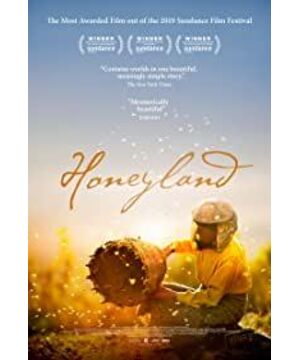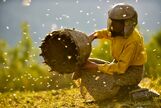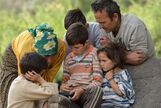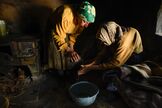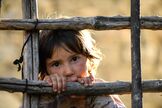Hatidze and his sick mother live in the Balkan mountains of North Macedonia. They make a living by raising wild bees. The arrival of a Turkish family broke their lonely and peaceful life. They first became friends, and they had conflicts because of beekeeping. Later, the family suffered an accident and chose to leave. In the end, Hatidze's mother also left her forever.
The director wrote on Honeyland’s official website that Hatidze's story is a microcosm for a wider idea of how closely intertwined nature and humanity are, and how much we stand to lose if we ignore this fundamental connection. The echo of Diversity (CBD), indeed, distant mountains, summer lakes, winter white snow, and the shining little creatures under the rock walls and the great miracles they bring all raise a kind of awe and touch of nature; Hatidze The difference between attitudes towards bees and Turkish families' attitudes towards bees, and the comparison of the results brought about by this difference, also constantly warns how people naturally "give back" those who treat them harshly. I was just so surprised that it turned out to be the core theme of the film. Everything else, the subtle human nature, the complexity of the relationship, the endless suffering of one person, a group of people, and a piece of land, all become foils.
When Hatidze said "I keep half of it, and half of the bees", she doesn't even know the "noble" word of biodiversity. Her words are only from her experience, and her behavior is only because of her pure and kind nature. Hatidze looks gently. When facing the bees that emerged from the tree hole, when petting kittens and puppies, when chatting with the most rebellious children in Turkish families, she just wanted to be nice to them. The director said here-you see, even the lowest level, uneducated farmers know to take care of the natural environment-he really doesn't know that she just keeps harvesting a can of honey and selling a can of 10 euros. Under his thoughts, the father of another family became a greedy predator. He didn't listen to Hatidze's advice and sold all the honey, so he brought bad luck to Hatidze, and eventually brought him bad luck like being retributed. But he has never struggled. At first, he repeatedly rejected the merchant’s offer to buy a large amount of honey, and for the second time he was not allowed to look at his beehive, but in the end he couldn’t stand the threats of the businessman, and he couldn’t stand the money to give his children. The tuition, living expenses, and new clothes they brought. People have no right to choose under the duress of survival. When you are thinking about biodiversity, you are so fucking privileged.
Hatidze, wearing a bright yellow shirt and a flowered skirt, walks among the mountains, so eye-catchingly alone. Together with her mother, she lived her life in silence. The new neighbor brought her uproar and brought countless troubles, but it also brought the beauty of the connection between people and made her experience the time when she gets along with children. The warmth and joy of her, when the family moved away, she looked from a distance, and I did not see half a relief. Compared with the past, her loneliness now has reflections and echoes. She also mentioned her sister and mentioned if she had children. When her mother stopped responding to her, I was heartbroken with her. I became angry.
When L and L saw the injury on Hatidze’s mother’s right cheek, I yelled, can the director team take her to treat it, but within 1 hour and 30 minutes, in the actual three years, her injury has been used like this The paper towel and headscarf covered her until she died. Is the death of his mother the most "perfect" ending for this documentary? The loneliness above loneliness, completely left only self and nature, completely became the last wild bee, walking in the vast snowy field, how beautiful, how romantic and sentimental. I even want to speculate maliciously that people hiding behind the camera have been secretly expecting things to develop towards this end. When watching, how many viewers realize that there is actually someone behind the camera. This film is indeed superb. It turns the eye of the machine into the eye of God, without leaving a trace, intercepting the concentration of the essence of human life in a corner of the earth. But no matter how seamless it is, the fact that the director group, as a group of real people, has been in exclusive, in-depth, and intimate association with Hatidze and her mother for three years, has not produced any feelings for Hatidze's mother. The sympathy and worries of the situation, did not give up their "golden natural material", their so-called "principle" of shooting, to truly help people around them, rather indirectly lead to the death of a person, symbolized after the film's global reputation Sexually bought a house in a village for Hatidze and helped her sell honey to get tears and praise from audiences in the first world countries. How cruel people can do this. I believe that most people will not turn a blind eye to the pain of their neighbors. And this is not so difficult. Would a group of people who live in the capital of Macedonia study art and hold the First World National Fund can not even afford medical expenses for trauma?
In the lens, the people at the bottom are living and competing on barren land. The high bottom exploits the middle bottom, and the middle bottom exploits the bottom. Outside the camera, a group of generous young people from the bottom countries hollowed out their bottom compatriots as the most precious value of a person, packaged it and exquisitely dedicated to the pursuit of high artistic sentiment, emphasized biodiversity audiences, they watched the entire film sadly, and then Said, all this is so bitter, and it is so beautiful.
View more about Honeyland reviews


